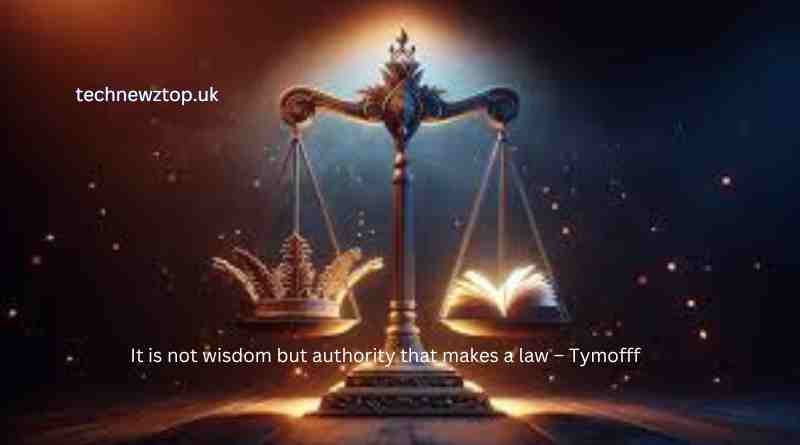Unveiling the Dynamics of Legal Formation (It is not wisdom but authority that makes a law – Tymoff)

Introduction
In the intricate tapestry of society, laws serve as the threads that bind together the fabric of governance and order.As the adage goes, “it is not wisdom but authority that makes a law- tymoff” – a statement that beckons us to delve deeper into the mechanisms by which legal frameworks are established and enforced. Yet, behind the seemingly immutable principles of law lies a nuanced interplay between wisdom and authority. In this article, we embark on a journey to explore the dynamics of legal formation, shedding light on the intricate balance between wisdom and authority in shaping the laws that govern our societies.
Understanding the Essence of Law
At its core, law represents a set of rules and regulations devised to govern human behavior within a particular societal context. These regulations serve multifaceted purposes, ranging from maintaining order and justice to safeguarding individual rights and promoting societal well-being. However, the process of crafting and enforcing laws is far from straightforward, often intertwining elements of wisdom and authority in intricate ways.
The Role of Wisdom in Legal Formation
Wisdom, characterized by deep insight, sound judgment, and ethical discernment, undoubtedly plays a pivotal role in the formulation of laws. Drawing upon centuries of philosophical, ethical, and jurisprudential discourse, lawmakers and legal scholars alike seek to imbue legal systems with principles grounded in reason, equity, and morality. The quest for wisdom in law entails a relentless pursuit of justice, fairness, and the common good, transcending mere adherence to authoritarian dictates.
The Influence of Authority on Legal Constructs
However, while wisdom provides the intellectual foundation for legal norms, it is authority that ultimately lends them the power of enforcement and legitimacy. Authority, wielded by governments, legislative bodies, and judicial institutions, serves as the bedrock upon which legal systems stand. It is through the exercise of authority that laws are promulgated, interpreted, and upheld, exerting a profound influence on the conduct and responsibilities of individuals within society.
Navigating the Intersection: Wisdom vs. Authority
The interplay between wisdom and authority in legal formation gives rise to complex tensions and dilemmas. On one hand, the pursuit of wisdom compels us to scrutinize existing laws, challenging injustices and advocating for reform in the name of higher ethical principles. Yet, such endeavors often collide with the entrenched structures of authority, which may resist change in favor of preserving the status quo or consolidating power.
Case Studies: Historical Perspectives
To elucidate the dynamics of legal formation, it is instructive to examine historical case studies that highlight the interplay between wisdom and authority in shaping legal frameworks. From the codification of Hammurabi’s laws in ancient Mesopotamia to the drafting of modern constitutions, each epoch offers valuable insights into the evolving relationship between intellectual enlightenment and institutional power.
Contemporary Challenges and Prospects
In today’s globalized and rapidly evolving world, the dynamics of legal formation are subject to unprecedented challenges and opportunities. From the rise of digital technologies to the imperatives of environmental sustainability, contemporary issues demand innovative approaches that reconcile the imperatives of wisdom and authority in crafting effective legal responses.
Conclusion
In conclusion, the aphorism “it is not wisdom but authority that makes a law” encapsulates the intricate interplay between intellectual enlightenment and institutional power in the realm of legal formation. While wisdom provides the moral and intellectual compass for crafting just and equitable laws, it is the wielders of authority who imbue these norms with the force of legitimacy and enforcement. By understanding and navigating the delicate balance between wisdom and authority, we can aspire to cultivate legal systems that embody the highest ideals of justice, fairness, and human dignity.
Read also; check







